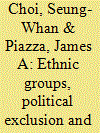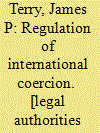|
|
|
Sort Order |
|
|
|
Items / Page
|
|
|
|
|
|
|
| Srl | Item |
| 1 |
ID:
143599


|
|
|
|
|
| Summary/Abstract |
This study examines whether the exclusion of ethnic groups from political power is an important contributing factor to domestic terrorism. To empirically test this question, we employ a negative binomial regression estimation on 130 countries during the period from 1981 to 2005. We find that countries in which certain ethnic populations are excluded from political power are significantly more likely to experience domestic terrorist attacks and to suffer from terrorist casualties; furthermore, ethnic group political exclusion is a more consistent and substantive predictor of domestic terrorist activity than general political repression or economic discrimination.
|
|
|
|
|
|
|
|
|
|
|
|
|
|
|
|
| 2 |
ID:
133135


|
|
|
|
|
| Publication |
2014.
|
| Summary/Abstract |
The mixed results of efforts to reform the governance of security forces in the aftermath of conflict require deeper examination of the political constraints that shape statebuilding processes. In Bosnia and Herzegovina, attempts to restructure and centralize the security forces led to a substantial though incomplete reform of the military, but limited impact on the police forces. These uneven results are rooted in the nature of political coalitions that constrain recipient leaders and shape their interaction with external actors. While Bosnian leaders mostly relied on a cohesive political base that favoured close links between political parties and the police forces, fragmentation within these parties generated internal threats that enabled reforms to the military. This case demonstrates the limits of external influence without changes to underlying political conditions.
|
|
|
|
|
|
|
|
|
|
|
|
|
|
|
|
| 3 |
ID:
085450


|
|
|
|
|
| Publication |
2008.
|
| Summary/Abstract |
The actual impact of judicial decisions often depends on the behavior of executive and legislative bodies that implement the rulings. Consequently, when a court hears a case involving the interests of those controlling the executive and legislative institutions, those interests can threaten to obstruct the court's intended outcome. In this paper, we evaluate whether and to what extent such constraints shape judicial rulings. Specifically, we examine how threats of noncompliance and legislative override influence decisions by the European Court of Justice (ECJ). Based on a statistical analysis of a novel dataset of ECJ rulings, we find that the preferences of member-state governments-whose interests are central to threats of noncompliance and override-have a systematic and substantively important impact on ECJ decisions
|
|
|
|
|
|
|
|
|
|
|
|
|
|
|
|
| 4 |
ID:
144192


|
|
|
|
|
| Summary/Abstract |
Despite many institutional features being changed during the post-communist transition, the regional administration in Romania witnessed a very limited change in post-communist times. Although it was a total political failure, the recent reshaping of the regional administration triggered a vivid public and scholarly interest on the matter. The purpose of the article is to shed new light on political constraints operating when it comes to reshaping regional design in Romania. Whereas official arguments pointed towards the necessity to address EU conditionality, the reshape was more likely underpinned by the government’s attempt to gain electoral advantages in the local elections scheduled for 2012. The decisive opposition made to the project by the Democratic Alliance of Hungarians in Romania (Uniunea Democrată a Maghiarilor din Romania) reveals the importance that ethnic factors have played in this context.
|
|
|
|
|
|
|
|
|
|
|
|
|
|
|
|
| 5 |
ID:
067286


|
|
|
|
|
| Publication |
New Port, Naval war college press, 2005.
|
| Description |
vi, 150p.
|
| Series |
NewPort papers; 25
|
| Contents |
B
|
|
|
|
|
|
|
|
|
|
|
|
Copies: C:1/I:0,R:0,Q:0
Circulation
| Accession# | Call# | Current Location | Status | Policy | Location |
| 050505 | 327.12/TER 050505 | Main | On Shelf | General | |
|
|
|
|
| 6 |
ID:
075331


|
|
|
|
|
| Publication |
2006.
|
| Summary/Abstract |
Following previous scholarship on domestic sources of foreign policy, this study investigates the extent to which economic performance, political constraints, and other factors influence US international cooperation from 1953 through 1998. Using data on US international treaties and executive agreements, we estimate a set of event count models. We find that the US enters into more international treaties and executive agreements with increased inflation. There are fewer new international treaties and executive agreements under divided government and during a president's first year in office. Furthermore, there are fewer new international executive agreements during war involvement. Finally, the US substitutes international treaties and executive agreements for one another, and there are rising trends over time in the numbers of US international treaties and executive agreements.
|
|
|
|
|
|
|
|
|
|
|
|
|
|
|
|
|
|
|
|
|